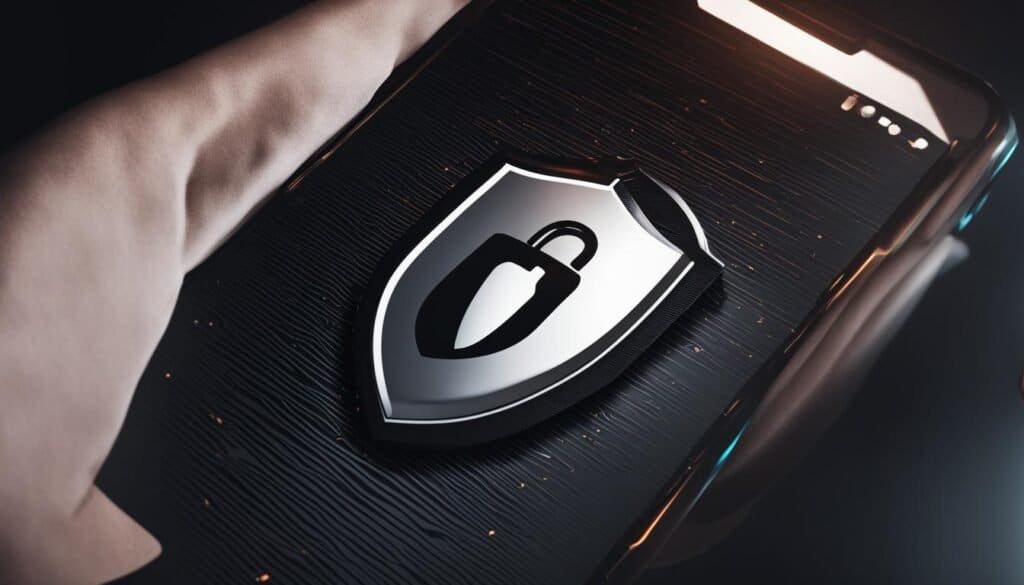Welcome to our comprehensive guide on mobile security! With technology advancing at a rapid pace, it's essential to take the necessary precautions to protect your mobile device from potential hackers. In this guide, we'll cover everything you need to know about mobile phone security, from phone hacking detection to implementing preventative measures to secure your phone from hackers. Our goal is to provide you with valuable information to ensure the safety of your device and your personal information.
Today, smartphones have become an essential part of our daily lives. We use them for communication, entertainment, and even for financial transactions. This increased reliance on mobile devices makes them a prime target for hackers who aim to exploit potential security vulnerabilities. Without proper protection, your mobile phone can be an easy target for cybercriminals.
It's crucial to understand the importance of mobile phone security and take proactive measures to secure your device. In this guide, we'll explore various methods to protect your phone from hackers, including detecting signs of phone hacking, implementing preventive measures, and securing your mobile network. We'll also introduce you to mobile security apps that can enhance your phone's overall protection.
Key Takeaways:
- Mobile phone security is crucial to protect your device and personal information from hackers.
- Understanding the signs of phone hacking can help you detect unauthorized access to your device.
- Implementing preventative measures, such as regular software updates and secure login methods, can fortify your device against potential threats.
- Securing your mobile network and encrypting your data are essential steps in protecting your device from hackers.
- Mobile security apps can enhance your phone's overall protection.
Signs of Phone Hacking: How to Detect Unauthorized Access
Phone hacking has become increasingly prevalent in recent years, and it's important to be able to detect any unauthorized access to your device. Here are some signs that may indicate your phone has been hacked:
- Unusual battery drain: If your phone's battery life has suddenly taken a nosedive, it could be a sign that a malicious app is running in the background.
- Slow performance: If your phone is suddenly lagging or freezing, it could be a sign that a hacker is using your device's resources.
- Unexplained data usage: If you notice a significant increase in data usage despite not changing your habits, it could indicate that a hacker is using your phone to access the internet.
- Unfamiliar apps: If you see apps on your phone that you don't remember downloading, it's possible that a hacker has installed them.
- Pop-up ads: If you're seeing an unusual number of pop-up ads on your phone, it could be a sign that malware has been installed.
If you notice any of these signs, it's important to take action immediately. Performing a factory reset on your phone can help remove any malware that may have been installed. However, be sure to back up your data first to avoid losing important information.
What to Do Next?
If you suspect your phone has been hacked or you want to take preventative measures, we'll cover these topics in more detail in the following sections. From securing your mobile network to using two-factor authentication, we'll provide you with practical tips and strategies to protect your device from potential threats.
Prevention Tips: How to Protect Your Phone from Hackers
Phone hacking is a serious issue that can compromise the security of your mobile device, leaving your personal information vulnerable to theft. Fortunately, there are several practical steps you can take to prevent your phone from being hacked. By implementing these precautions, you can ensure the safety of your device and the information it contains.
1. Use Strong Passwords
One of the most effective ways to prevent phone hacking is to use strong passwords to unlock your device and sensitive apps. Avoid using easily guessable passwords, such as your birthdate or pet's name, and opt for complex combinations of letters, numbers, and symbols. Additionally, consider changing your passwords regularly to further protect your device.
2. Install Anti-Virus Software
Installing an anti-virus software on your phone can help prevent hacking attempts and detect any potential threats. Make sure to choose reputable anti-virus software and keep it up to date to ensure optimal protection.
3. Keep Your Software Up To Date
Keeping your phone's software up to date is crucial for maintaining optimal security and protecting against hacking attempts. Software updates often include security patches and bug fixes that can help safeguard your device from potential threats.
4. Be Cautious When Using Public Wi-Fi
Public Wi-Fi networks can be a breeding ground for hackers, as they often lack proper security measures. Avoid accessing sensitive information, such as banking or personal accounts, while connected to public Wi-Fi. Additionally, consider using a virtual private network (VPN) to encrypt your internet connection and protect your information.
5. Be Wary of Suspicious Emails and Messages
Hackers may attempt to gain access to your device through phishing attacks or malware hidden in emails and messages. Always be cautious when opening emails or messages from unknown senders, and avoid clicking on suspicious links or attachments. Additionally, consider installing an anti-spam and anti-phishing software on your device to further protect against these types of attacks.
6. Disable Unnecessary Features
Disabling unnecessary features, such as Bluetooth and NFC, when not in use can help prevent unauthorized access to your device. Additionally, consider turning off location services and limiting app access to your personal information to further protect your device from potential threats.
By following these prevention tips, you can significantly reduce the risk of your phone being hacked. Remember to always prioritize the security of your device and take proactive measures to ensure its protection.
Importance of Mobile Phone Security: Understanding the Risks
In today's digital age, mobile phones have become an indispensable part of our lives. We use them to communicate, access social media, and conduct financial transactions. However, this increased connectivity comes with an increased risk of cybersecurity threats, including hacking, phishing, and malware attacks. If you fail to take proper precautions, you could be exposing yourself to serious risks that may compromise your personal and financial information.
Mobile phone security is crucial to protect against these potential threats. By securing your device, you can reduce the risk of unauthorized access and minimize the impact of any potential security breaches.
Understanding the Risks
There are several risks associated with not taking mobile phone security seriously:
- Your personal and financial information could be accessed by hackers, leading to identity theft and financial losses.
- Your device could be infected with malware, allowing hackers to track your activity, steal your data and even take control of your device.
- Your sensitive information could be intercepted when using public Wi-Fi networks or Bluetooth connections, allowing hackers to view or steal your data.
These are just a few examples of the many risks associated with failing to prioritize mobile phone security. By taking the necessary precautions, you can reduce the likelihood of these threats impacting you and your device.
How to Protect Your Mobile Phone
To protect your mobile phone from potential threats, there are several steps you can take:
- Keep your device's software up to date to ensure you have the latest security patches and features. This will help protect against known vulnerabilities and potential threats.
- Use secure login methods, such as biometric authentication or strong passwords, to prevent unauthorized access to your device.
- Utilize two-factor authentication to add an extra layer of protection to your device.
- Be cautious when using public Wi-Fi or Bluetooth connections, and avoid accessing sensitive information when connected to these networks.
- Regularly back up your data and consider encrypting sensitive information to protect against potential data breaches.
- Install reliable mobile security apps that can detect and prevent potential threats.
By following these best practices, you can significantly enhance the security of your mobile device and reduce the risk of falling victim to a cyberattack.
Remember, mobile phone security is not something to take lightly. By failing to prioritize the security of your device, you could be exposing yourself to serious risks that may compromise your personal and financial information. Take the necessary precautions to protect your mobile phone from potential threats and avoid becoming the next victim of cybercrime.
Common Methods Used by Phone Hackers
Phone hackers use various techniques to gain unauthorized access to your device. Being aware of these methods can help you detect signs of phone hacking and take appropriate measures to protect your phone from potential threats.
Phishing
Phishing is a common method used by hackers to steal personal information. They often send unsolicited emails or text messages that appear to be from a trusted source, tricking the recipient into providing sensitive information such as passwords or credit card details. To protect yourself from phishing attacks, avoid clicking on suspicious links or opening attachments from unknown sources.
Malware
Malware is another common method used by phone hackers. They may use malicious software to gain access to your device and steal personal information, or to control your phone remotely. To protect your phone from malware, ensure that you have an antivirus program installed and only download apps from trusted sources.
Unsecured Wi-Fi Networks
Using unsecured Wi-Fi networks can also make your phone vulnerable to hacking attempts. Hackers can intercept the data you send and receive over these networks, potentially accessing your personal information. To protect yourself, avoid using public Wi-Fi networks for sensitive activities such as banking or shopping, or use a Virtual Private Network (VPN) to encrypt your data.
Jailbreaking or Rooting
Jailbreaking or rooting your phone may give you access to additional features or apps, but it also removes certain security measures put in place by the manufacturer. This can make your phone more vulnerable to hacking attempts. To protect your phone, avoid jailbreaking or rooting your device unless you are confident in your ability to secure it.
By understanding the common methods used by phone hackers, you can take steps to protect your phone from potential threats. Always be vigilant and implement the necessary security measures to ensure the safety of your mobile device.
Importance of Regular Software Updates
Regular software updates are an essential aspect of mobile phone security. These updates provide bug fixes and security patches that address any vulnerabilities in your device's software, ensuring that it remains protected against potential hacking attempts.
Outdated software can leave your phone vulnerable to security breaches, making it easier for hackers to gain unauthorized access to your device. Ensuring that your phone is running the latest software version is, therefore, crucial for maintaining optimal security.
Additionally, software updates often introduce new security features that can further enhance your phone's protection. These features may include improved encryption methods, stronger passwords, and increased protection against malware and phishing attacks.
It's important to note that regular software updates are not just important for mobile phone security, but also for overall smartphone security. By staying up-to-date on software updates, you can ensure that your phone is running efficiently and effectively.
How to Check for Software Updates:
Checking for software updates on your mobile device is relatively simple. Here's how to do it:
- Go to your phone's settings
- Select "System" or "Software Update"
- Tap "Check for Updates"
If an update is available, download and install it as soon as possible to ensure that your device remains secure.
Secure Login Methods: Strengthening Your Phone's Security

Using secure login methods is one of the most effective ways to ensure mobile phone security and protect your phone from potential hackers. Here are some of the best options to consider:
Biometric Authentication
Biometric authentication is a highly secure login method that uses your physical characteristics as a form of identification. This can include facial recognition, fingerprint scanning, or iris scanning. By using biometric authentication, you can ensure that only you can unlock your phone, and prevent unauthorized access from hackers or thieves.
Strong Passwords
Creating a strong password is another effective way to secure your phone from hackers. Your password should be at least 8-12 characters long, with a mix of upper and lowercase letters, numbers, and special characters. Avoid using common words or phrases, such as "password" or "123456," as these can be easily guessed or hacked.
Passphrases
Passphrases are a more secure alternative to traditional passwords. These are longer, more complex phrases that are easier to remember than a string of random characters. For example, "Mydogate2TacoBell!" is a strong passphrase that would be difficult for hackers to crack.
Two-Factor Authentication
Two-factor authentication is an additional layer of security that requires a second form of identification to access your phone. This can include a code sent to your email or phone, or a fingerprint or face scan in addition to your password. By implementing two-factor authentication, you can further protect your phone from potential security threats.
Using these secure login methods can help strengthen your phone's security and prevent unauthorized access from hackers. Implementing these strategies, along with other preventative measures, can help you ensure the mobile phone security of your device.
Using Two-Factor Authentication: Adding an Extra Layer of Security
Two-factor authentication is an extra layer of security that requires users to verify their identity through two different methods before gaining access to their device. This authentication method significantly reduces the risk of unauthorized access to your device and is an essential feature of mobile phone security.
Enabling two-factor authentication means that even if a hacker manages to acquire your password, they won't be able to gain access to your device without the second authentication method. It's an effective way to secure your phone from hackers and protect your sensitive data.
There are different types of two-factor authentication methods available, including:
- Biometric authentication (fingerprint or facial recognition)
- One-time passwords (generated through text messages or specialized apps)
- Hardware tokens (physical devices that generate codes)
It's recommended to use a combination of these methods for maximum security.
Enabling two-factor authentication on your device is easy. Simply go to your device's settings and select the option for two-factor authentication. You'll be prompted to choose your preferred method, after which you'll need to enter a verification code to activate it.
Make sure to keep your second factor device or code in a secure location, such as a password manager, to reduce the chance of it falling into the wrong hands. By enabling two-factor authentication, you'll be taking an important step towards securing your phone from hackers and maintaining optimal mobile phone security.
Securing Your Mobile Network: Wi-Fi and Bluetooth Considerations

Protecting your mobile network is crucial to ensuring the security of your mobile device. Wi-Fi and Bluetooth, while convenient, can also pose significant risks if not used properly. In this section, we'll provide you with best practices for using these features safely and minimizing the risk of hacking.
Wi-Fi Security
When using public Wi-Fi networks, it's important to remember that these networks are often unsecured and can be easily accessed by hackers. To protect your device and data, follow these tips:
- Use a virtual private network (VPN) to encrypt your internet traffic and keep your activity private.
- Avoid accessing sensitive information, such as bank accounts or personal email, on public Wi-Fi networks.
- Disable auto-connect settings to prevent your phone from automatically connecting to unfamiliar networks.
- Regularly forget saved Wi-Fi networks to remove the risk of your device automatically connecting to unsafe networks.
By following these guidelines, you can ensure that your Wi-Fi usage is secure and free from potential hacking attempts.
Bluetooth Security
Bluetooth technology allows you to connect your phone to various devices, such as headphones or speakers. However, this feature can also be vulnerable to hacking attempts and illicit access to your device. To protect your phone from Bluetooth-related security risks, consider the following:
- Ensure that Bluetooth is turned off when not in use to prevent unauthorized devices from attempting to connect to your phone.
- Use Bluetooth in "invisible" mode to prevent other devices from discovering your phone.
- Only pair your phone with devices that you trust and have a secure connection.
- Regularly delete paired devices from your phone to remove the risk of unauthorized access.
By implementing these Bluetooth security measures, you can minimize the risk of hackers gaining access to your mobile device.
Protecting Your Data: Backing Up and Encrypting Your Phone
One of the most important steps you can take to protect your phone from hacking is to secure your data. Whether it's personal photos, sensitive financial information, or important work documents, your data is valuable and should be protected at all times.
The first step in protecting your data is to regularly back up your phone. This ensures that if your phone is ever lost, stolen, or hacked, you won't lose all of your important information. There are several ways to back up your data, including:
- Cloud storage services like iCloud or Google Drive
- Physical storage devices like USB drives or external hard drives
Whichever method you choose, it's important to schedule regular backups, so you always have an up-to-date copy of your data.
In addition to backing up your data, it's also essential to encrypt your phone. Encryption scrambles your data, making it unreadable to anyone who doesn't have the encryption key. This adds an extra layer of security to your device, protecting your data even if your phone is stolen or hacked.
Most modern smartphones come with built-in encryption features, which you can enable in your device settings. It's a simple step that can go a long way in protecting your data and ensuring your phone remains secure.
Remember, securing your data is just as important as securing your device. By regularly backing up and encrypting your phone, you can protect your valuable information and minimize the risk of data theft.
Mobile Security Apps: Enhancing Your Phone's Protection.
If you're looking to ramp up your mobile phone security, installing a mobile security app can be an excellent choice. These apps can provide an extra layer of protection against potential threats, offering features such as antivirus scans, anti-phishing measures, and more. Let's take a closer look at some of the top mobile security apps available.
Norton Mobile Security
Norton Mobile Security is a comprehensive security suite that includes antivirus protection, anti-phishing measures, and anti-malware detection. The app also includes features to protect your privacy, such as call blocking and a privacy advisor to help you manage app permissions. Norton Mobile Security is available for both Android and iOS devices.
Avast Mobile Security
Avast Mobile Security is another highly-rated security app, offering a range of features including antivirus protection, anti-malware detection, and Wi-Fi security scanning. The app also includes tools to optimize your phone's performance, such as a junk cleaner and call blocker. Avast Mobile Security is available for both Android and iOS devices.
Lookout Security & Antivirus
Lookout Security & Antivirus is a powerful security app that includes antivirus protection, anti-malware detection, and anti-phishing measures. The app also includes features to help you locate your phone if it's lost or stolen, such as a loud alarm and location tracking. Lookout Security & Antivirus is available for both Android and iOS devices.
Conclusion
By installing a mobile security app, you can add an extra layer of protection to your phone and minimize the risk of potential threats. While these apps are not foolproof, they can provide valuable assistance in maintaining your mobile phone security.
Conclusion
Now that you have a better understanding of mobile security, you can take the necessary steps to protect your phone from potential hackers. Remember that detecting signs of phone hacking is crucial, as is implementing preventative measures to fortify your device's security.
Regular software updates are essential for maintaining optimal security and protecting against hacking attempts. Additionally, using secure login methods and two-factor authentication can add an extra layer of protection to your device.
Securing your mobile network is also vital, and you should always use Wi-Fi and Bluetooth safely. Finally, to protect your data from potential hackers, be sure to back up your phone and encrypt any sensitive information.
By utilizing the various tips and strategies we've discussed in this guide, you can enhance your phone's overall protection and prevent unauthorized access. Stay vigilant and take proactive steps to ensure your mobile device remains safe from potential threats.
Protecting your phone is essential. Who's hacking my phone? Don't wait to find out. Take action now!
Are There Any New Hacking Techniques Featured in Hacks Season 3?
The hacks season 3 renewal status is eagerly awaited by fans. With the show focusing on the world of hacking, viewers are curious about any new techniques that might be featured. From innovative methods to cutting-edge technologies, the upcoming season holds the potential to surprise and captivate audiences. Stay tuned for updates on the hacks season 3 renewal status and prepare for an exciting journey into the ever-evolving realm of hacking.
FAQ
How can I detect if my phone has been hacked?
There are several signs that may indicate unauthorized access to your phone, such as sudden battery drain, unusual data usage, unfamiliar apps or changes to settings, and receiving suspicious text messages or calls.
How can I protect my phone from hackers?
To protect your phone from hackers, you can take several preventive measures such as keeping your software up to date, using strong and unique passwords, enabling two-factor authentication, avoiding insecure Wi-Fi networks, and being cautious of suspicious links or downloads.
Why is mobile phone security important?
Mobile phone security is important because it helps protect your personal information, prevents unauthorized access to your device, safeguards your data from being stolen or compromised, and ensures your privacy and online safety.
What are common methods used by phone hackers?
Phone hackers often employ techniques such as malware or spyware installation, phishing attacks, SIM card swapping, Wi-Fi hacking, and exploiting software vulnerabilities to gain unauthorized access to your device.
Why are regular software updates important for mobile security?
Regular software updates are important for mobile security because they often include patches and fixes that address known vulnerabilities. By keeping your software up to date, you can minimize the risk of exploitation by hackers.
How can I strengthen my phone's security with secure login methods?
You can strengthen your phone's security by utilizing secure login methods such as biometric authentication (fingerprint or facial recognition), implementing complex and unique passwords, and enabling device encryption for added protection.
What is two-factor authentication and why should I use it?
Two-factor authentication is an additional security measure that requires you to provide two forms of identification (such as a password and a unique code sent to your phone) to access your device. It adds an extra layer of protection against unauthorized access.
How can I secure my mobile network and protect against hacking?
To secure your mobile network, you should use strong and unique passwords for Wi-Fi and Bluetooth connections, avoid connecting to public or unsecured networks, disable automatic network connections, and regularly check for firmware updates for your router or access point.
How can I protect my data on my phone?
To protect your data on your phone, you should regularly back up your device to a secure location (such as cloud storage or an external hard drive), enable encryption for sensitive information, and avoid storing personal or sensitive data in easily accessible locations on your device.
Are there any mobile security apps that can help enhance my phone's protection?
Yes, there are various mobile security apps available that can enhance your phone's overall protection. These apps offer features such as antivirus scanning, anti-malware protection, secure browsing, app locking, remote device tracking, and data backup. Some popular options include Norton Mobile Security, McAfee Mobile Security, and Avast Mobile Security.





